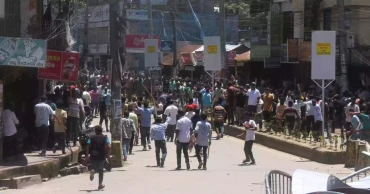poll
Candidates not allowed to enter any center other than their own: JnUCSU Election Commission
Candidates will not be allowed to enter any polling center other than their own. Even after casting their vote, a candidate will not be permitted to re-enter their designated center, said the Election Commission of the Jagannath University Central Students’ Union (JnUCSU) and Hall Students’ Union Election 2025.
The information was disclosed on Monday night at a press conference organized by the Election Commission at Jagannath University, where Chief Election Commissioner Professor Dr. Mostafa Hasan briefed the media.
He further said that all preparations for conducting the election have been completed. With the cooperation of all concerned, he expressed optimism that a transparent, orderly, acceptable, and historic election would be held.
According to him, voting will take place uninterrupted from 8:30 a.m. to 3:00 p.m. on Tuesday. However, voters who enter the polling center and its perimeter before 3:00 p.m. will be allowed to cast their votes.
Read more: Long-cherished JnUCSU Election on Tuesday
As per Election Commission data, a total of 16,645 voters will exercise their franchise at 38 polling centers in the JnUCSU election. In addition, 1,242 voters will vote at a single polling center for the hall students’ union election.
The Chief Election Commissioner said that votes will be counted separately at each center after polling ends. The respective returning officer will announce the results immediately at the center. Later, after consolidating results from all centers, the Election Commission will announce the final results. A total of six machines will be used for vote counting.
To ensure transparency and security, a three-tier security system will be enforced across the campus, he said. The entire university campus and all polling centers have been brought under CCTV surveillance. Moreover, live broadcasting of vote counting will be arranged through three digital boards across the campus and surrounding areas, as well as on the social media platform Facebook.
He also stated that voters whose ID cards have expired will be able to vote by accessing the voter list and collecting their voter ID via QR code scan on mobile phones or as a printed copy. The voter list will be photo-based.
The Election Commission further informed that indelible ink will be used at polling centers. Ballot papers will be supplied department-wise in the morning. Students will vote only in the department where they are registered as voters. The ballot papers will contain special security codes.
Read more: Election season kicks off in Bangladesh; 2,582 candidates submitted nomination papers
It was also announced at the press conference that a ‘mock test’ was completed on Monday ahead of the election, in which around 30 candidates participated. No extra ballots have been printed. After casting their votes, voters must leave the campus. Only candidates and valid cardholders will be allowed to remain on campus.
Those present at the press conference included Election Commissioners Professor Dr. Md. Shahidul Islam, Professor Dr. Kaniz Fatema Kakoli, Professor Dr. Zulfikar Mahmud, and Dr. Md. Anisur Rahman. Also present were Director of the ICT Cell Professor Dr. Mohammad Nasir Uddin and PRIP Director Dr. Muhammad Anwarus Salam.
1 month ago
Long-cherished JnUCSU Election on Tuesday
The Jagannath University Central Students’ Union (JnUCSU) and Hall Students’ Union elections will be held on Tuesday (December 30, 2025).
Voting will start at 9:00 am and continue until 3:00 pm without any break.
A total of 16,500 students are expected to exercise their voting rights at 178 booths across 39 polling centers.
Ballot papers will be distributed to the polling centers in the morning before voting begins. Votes will be counted using digital OMR machines. To ensure security, CCTV cameras have been installed at every polling center.
Read more: Candidates not allowed to enter any center other than their own: JnUCSU Election Commission
Ahead of the election, the university administration has strengthened security in and around the Jagannath University campus. Alongside law enforcement personnel, intelligence officers have also been seen on duty. A police control room has been set up at Victoria Park in front of the university.
Meanwhile, to ensure campus security, a separate notice issued by the Registrar’s Office instructed all students to vacate the campus by 3:30 pm on Monday. It was also announced that all buses operating under the university transport pool would depart 15 minutes earlier than scheduled. Officers and teachers assigned election duties have been directed to perform their responsibilities in accordance with the Election Commission’s guidelines.
Faisal Ahmed, officer-in-charge (OC) of Kotwali Police Station, said there is no security concerns surrounding the elections.
“We have taken all necessary preparations. Special forces are on standby around the campus, and CCTV cameras have been installed at various important points for round-the-clock surveillance,” he added.
Election Commissioner Professor Dr. Zulfikar Mahmud said that all preparations related to the election have been completed.
“Responsibilities have been assigned to teachers and officials for election duties. We hope the election will be held smoothly with everyone’s participation,” he added.
Jagannath University Vice-Chancellor Professor Dr. Md. Rezaul Karim said, “The JnUCSU election will definitely be held. The ministry has sought some information from me regarding security matters. Overall, I am optimistic that the election will be conducted in a very fair and festive environment.”
Jatiyatabadi Chhatra Dal-backed VP candidate AKM Rakib said, “Tomorrow (Tuesday) is our long-cherished election, for which we have been continuing movements and struggles for a long time. We have stood by the students in the past and will continue to do so in the future. We hope for a good election in a festive atmosphere.”
Islami Chhatra Shibir-backed VP candidate Riazul Islam said, “Students are spontaneously participating in our campaign. Just as talented students in other campuses across Bangladesh have placed their trust in Shibir, we are hopeful that the same trust will be reflected in the JnUCSU election.”
Chhatra Shakti-backed Oikjoboddho Jobiyan panel’s VP candidate Kishor Samya said, “The Election Commission is merely a nominal commission. This commission could not resolve even a single violation of the code of conduct. We call upon students to vote against oppression.”
JnUCSU election: Students asked to vacate campus by 3:30pm
According to the list published on the website, there are 4 candidates for the Liberation War and Democracy position, 9 for Education and Research, 5 for Science and Technology Editor, 5 for Health and Environment Editor, 4 for Law and Human Rights Editor, 8 for International Affairs Editor, 7 for Literature and Culture Editor, 7 for Sports Editor, 4 for Transport Editor, 10 for Social Service and Student Welfare Editor, 7 for Library and Seminar Editor, and 57 candidates contesting 7 general member positions.
In the women’s hall, for 13 positions, the preliminary list includes 3 candidates for Vice-President (VP), 3 for General Secretary (GS), 2 for Assistant General Secretary (AGS), 2 for Literature and Publication Editor, 4 for Culture Editor, 2 for Library Editor, 2 for Sports Editor, 3 for Social Service and Student Welfare Editor, 4 for Health and Environment Editor, and 8 candidates contesting 4 general member positions in the hall parliament.
1 month ago
Bangladesh Polls: Permission must for social, religious events before electioneering
The Election Commission (EC) has allowed the celebration of the national and international days and arrangements of social and religious events during pre-campaign period with prior permission or consent from the returning officers concerned.
The directive was issued through a circular released on Sunday night (December 14, 2025) to ensure the maintenance of a conducive electoral atmosphere during the pre-election period.
The circular mentions that the schedule for the 13th parliamentary election and the referendum was announced on December 11, 2025, and the polls will be held on February 12, 2026.
According to the Section 18 of the Code of Conduct for Political Parties and Candidates in Parliamentary Elections Rule, 2025, the electioneering can be conducted from three weeks before the polling day until 48 hours prior to the start of voting, subject to compliance with the prescribed conditions.
Read more: UN briefs Bangladesh’s political parties on election commission support
“Outside the stipulated campaign period, national and international days can be observed as well as religious, social and similar events can be organised without hampering the electoral environment and in compliance with the code of conduct. However, prior consent or permission from the returning officer concerned must be obtained,” says the circular signed by EC Deputy Secretary Mohammad Monir Hossain.
The election campaign will start on January 22 and continue till 48 hours before the balloting period (7:30am on February 10), according to the schedule announced by Chief Election Commissioner AMM Nasir Uddin.
This circular was sent to all the 69 returning officers – Dhaka and Chattogram divisional commissioners, Dhaka, Chattogram and Khulna Regional Election Officers and 64 district deputy commissioners.
As per the schedule, the deadline for the submission of nomination paper is December 29, while the scrutiny of nomination paper is on December 30-January 4 and the last date for the withdrawal of candidature is January 20.
Read more: Bangladesh national election, referendum on Feb 12; schedule announced
The last date for submission of appeal against the decisions of the returning officers is January 11 and the appeals would be disposed of on January 12-18. The returning officers will publish the final lists of candidates and allocate electoral symbols on January 21.
The balloting will be held from 7:30am to 4:30pm without any break on February 12.
1 month ago
Even if action can’t be taken now, strong measures will be taken after election: Quader on those whose wealth saw abnormal increase
Awami League General Secretary Obaidul Quader has said that action will be taken after the election against those whose wealth increased abnormally.
“Even if action cannot be taken at the moment as the government is only conducting routine work, strong measures will be taken after the election,” Quader said in response to a question referring to Transparency International Bangladesh’s (TIB) allegation of discrepancies in the affidavits submitted by the aspirants for the upcoming 12th parliamentary election.
Read: AL Pledges to Expand Modern Urban Facilities to Every Village in Smart Bangladesh
The Awami League general secretary made the remarks at a press conference on contemporary issues at the party’s central office in Dhanmondi this afternoon (December 28, 2023).
In its report, TIB questioned the authenticity of candidates’ income, wealth, loans, and debt disclosed to the Election Commission.
The Transparency International Bangladesh (TIB) accused a minister, who remains unnamed, of owning “undisclosed overseas companies” engaged in real estate business abroad, with total assets valued at around Tk 2,312 crore.
Commenting on BNP's movement, Quader said the party has lost the support of the people.
“If there was public support [for BNP’s movement], no party would have to carry out sneak attacks to oust the government,” said the AL general secretary.
Read: In Smart Bangladesh Awami League pledges more safeguards for minorities, end of intolerance
Calling the incidents of violence in different constituencies “isolated,” Obaidul Quader said, "It is normal. No candidate will boycott the election.”
The candidates want to bring voters to the polling centres by convincing them, he said.
2 years ago
‘Want the entire world to observe our polls and learn from us’: Momen
Foreign Minister AK Abdul Momen has said they want to see a "free, fair, non-violent and transparent" election and achieve the goal to build a "Smart Bangladesh" ensuring peace and stability.
"We want all from the entire world to come and see, and learn from us," he said while talking to journalists after his meeting with a team of European Union (EU) experts at his residence on Wednesday (December 27, 2023) night.
Momen, however, said the visiting EU team only listened to him as they wanted to know a few things, but did not make any comment on the election. “They didn't even want to talk to the media.”
He said Bangladesh is a democratic country, and there is a very strong Election Commission in place that is taking all necessary steps to hold a fair election.
Asked about BNP's allegations to the EU team in a separate meeting, the foreign minister said the government has not arrested anyone on political grounds but arrested those who were involved in “terrorist activities.”
Also read: Don’t want to see any proxy war in region; want to show world fair polls: FM
He referred to CCTV footage and statements made by some BNP supporters, mentioning who instructed them to carry out arson attacks and vandalism.
"Not a single person has been arrested for political reasons . Only criminals have been arrested. We cannot tolerate terrorism," Momen said.
The foreign minister said some big countries want Bangladesh to purchase things from them, but Bangladesh does not do so at the cost of sacrificing public interests.
"That's why they are unhappy to some extent. But we follow our principles. If you stand by your principles, your dignity will be enhanced," Momen said.
Also read: EU polls mission holds meeting with FM Momen, BNP leaders in Sylhet
He also talked about Prime Minister Sheikh Hasina’s desire to build a “Sonar Bangla” and a “Smart Bangladesh.”
"We want peace. We want stability. We don't want terrorism. We want freedom of media and freedom of speech. We want the continuation of democracy. We want more job opportunities," Momen told the reporters, referring to Awami League's election manifesto.
Before going to Sylhet, Momen also talked to reporters in Dhaka on Wednesday afternoon.
Highlighting the importance of peace and stability for greater development, he said they do not want to see any “proxy war” in the region.
“Our main goal is that we do not want to see any proxy war here. Problems remain there where we see proxy war despite having resources. Europe has fallen into proxy war and is facing challenges,” he told reporters, noting that there might be efforts to make the countries in the region weaker.
Momen said Bangladesh has taken a leadership role in the region and other countries acknowledge this.
Read more Cumilla presiding officer show-caused for campaigning in favour of AL candidate Mustafa Kamal
2 years ago
Come to polling centres early, cast votes for Boat: PM Hasina at Pirganj rally
Awami League President Sheikh Hasina on Tuesday requested all voters to go to the polling centres early in the morning and cast their ballots for 'boat' to let her party serve them again.
“The election will be held on January 7. Please go to the polling centres early morning with other voters and cast your votes for boat (the electoral symbol of Awami League,” she said.
The prime minister said this while addressing a public rally at Taraganj Degree College.
Her younger sister Sheikh Rehana was present on dais.
She said that boat is the symbol of the boat of Prophet Nuh that saved the human race during the Great Flood,
“This boat gave your independence and developed your living standard,” she said.
“Will you cast your votes for the boat? Promise me, please raise your hands,” she asked while the audience raised their hands and chanted slogans for the AL election symbol.
She also introduced Awami League nominated candidate for Rangpur-2 constituency Abul Kalam Mohammad Ahasanul Huq Chowdhury (Duke) at the rally and requested all to vote for him.
Read: ‘PM sounded sincere about ensuring infrastructure facilities enabling those with disabilities to move independently’
Referring to numerous implemented development programmes of the government in the last 15 years, Hasina said that it was possible for the government as the people gave votes for her party in the last three elections.
She also said that there are some development programmes left unfinished to materialise the dream of the Father of the Nation Bangabandhu Sheikh Mujibur Rahman.
These are to make the country free from homeless and landless people and eradicate poverty completely, she said.
2 years ago
A day marked by violent clashes as political parties take to the streets across country
At least one person was killed and several hundreds were injured in violent clashes across the country as leaders and activists of Awami League and Bangladesh Nationalist Party (BNP) took to the streets across the country in a show of force ahead of the next general election.
A young man was killed and 50 people were injured in sporadic clashes between leaders and activists of BNP and Awami League in Laxmipur district town on Tuesday.
According to Mahfuzzaman Ashraf, superintendent of Laxmipur police, both BNP and Awami League brought out processions across the city.
Also read: Not a victory march, it’s a defeat march: Quader on BNP’s program
At 4 pm, the procession of BNP and Awami League mingled at Samad Academy intersection. At one stage, the BNP men tore down banners of Awami League, triggering a chase and counter chase.
The BNP men, numbering 30/40, chased some 15/20 men of Awami League, forcing them to take shelter in a building inside Madin Ullah Housing.
Sajib of Chandraganj was found lying on the ground floor of the building, and he died due to profuse bleeding, police said quoting locals.
Also read: Quit now, people don’t want to see you in power anymore: Fakhrul asks govt
Earlier on Tuesday, BNP's Dhaka march for its one-point demand came under attack near Mirpur's Govt Bangla college.
As part of their one-point movement, BNP started a march towards Old Dhaka from Gabtoli Bus Station around 11:20 am.
Also read: 50 injured in AL, BNP, police clash in Feni
When the march reached near the college in Mirpur around 11:45 am, some youths attacked them, resulting in a clash, witnesses said.
2 years ago
FBCCI Board of Directors' poll on July 31, candidates submitting nomination papers
The poll to elect the Board of Directors of the Federation of Chamber of Commerce and Industries (FBCCI) will be held on July 31.
On the polling day, the FBCCI members will cast votes in favor of their chosen candidate from 9 am to 4 pm. The names of elected directors will be announced on that day.
The election to the posts of FBCCI president, senior vice-president, and six vice-presidents will be held on August 2 by the vote of elected directors for the period of 2023-2025.
FBCCI-HSBC to work together to boost exports between Bangladesh-UK
The FBCCI election schedule was announced on May 11, 2023.
Mahbubur Alam has submitted his nomination papers as the panel leader for the 2023-25 term of the board of directors of the FBCCI. He is the President of the Chittagong Chamber of Commerce & Industry and former Vice President of FBCCI.
If Mahbubur Alam is elected as the panel leader, then he will be the next president of the FBCCI. He submitted nomination papers on Saturday (July 1) to the Chamber Bhaban in Motijheel on Saturday.
FBCCI and Faction sign MoU to boost research, innovation
The chairman of the Election Board A Matin Chowdhury accepted the nomination papers while election board members Shamsul Alam and KMN Manjurul Haque were present at that time.
FBCCI president Jasim Uddin, Senior Vice President Mostafa Azad Chowdhury Babu, Vice President MA Momen, Amin Helali, Habib Ullah Don, MA Razzak Khan Raj, Former Senior Vice President Md. Ali, former vice president Helal Uddin, BGMEA president Faruk Hassan and other senior leaders of different associations were present.
Policy support needed in budget for import-alternative industry in Bangladesh: FBCCI President tells ERF discussion
2 years ago
Gaibandha-5 by-polls: Festive mood as voting underway
Voting in the by-election for Gaibandha-5 constituency, which was suspended due to irregularities, is underway with participation of voters in a festive mood.
Voting started at 8 am and will continue till 4:30 pm. No untoward incident was reported till the filing of this report around 10 am.
People were seen standing in long queues since morning, ignoring the cold.
The presence of female voters is comparatively higher than their male counterparts.
A total of 3,39,743 people are expected to exercise their franchise in 145 polling centres. Of them, 1,70,160 are females and 1,69,583 are male.
District Election Officer and Returning officer Abdul Motaleb said that of the 145 polling centres, 72 are consider "important" while 32 are counted as "most important".
Read: EC has 'no legal obligation' to bring parties to election
All preparations have been taken to hold a smooth, free and fair election, he said.
Elections will be monitored through CCTV cameras as done before.
Rab, police, BGB and Ansar members will remain deployed to hold the election peacefully, said Motaleb.
The candidates of the Gaibandha-5 by-election are: Awami League candidate Mahmud Hasan Ripon, Jatiya Party candidate AHM Golam Shaheed Ranju, Bikalpa Dhara candidate Advocate Jahangir Alam and independent candidate Syed Mahbubur Rahman.
The constituency consists of Saghata and Phulchhari upazilas.
On October 12 last year, the Election Commission (EC) suspended the by-election due to “rampant irregularities” on the election day and later the commission fixed January 4 for holding the polls.
Following the death of Gaibandha-5 lawmaker and Deputy Speaker of the Parliament Fazle Rabbi Miah on July 22, 2022, it became a constitutional obligation to hold election for the parliamentary seat by October 20, 2022. Accordingly it was scheduled for October 12.
A three-member committee was formed to look into the election irregularities on October 12 last year.
Following the recommendations of the committee, the Election Commission took punitive actions against 133 officials including an additional deputy commissioner, five sub-inspectors and returning officer of the election.
Read More: EC to delve into slow voting complaint in Rangpur City Corporation Polls
3 years ago
Over half of 17.5mn Twitter users who voted say Musk should step down as CEO
More than half of 17.5 million users who responded to a Twitter poll created by billionaire Elon Musk over whether he should step down as head of the company had voted yes by the time the poll closed Monday.
There was no immediate announcement from Twitter, or Musk, about whether that would happen, though Musk said that he would abide by the results. Musk attended the World Cup final on Sunday and may be midflight on his way back to the U.S. early Monday.
Musk has taken a number of unscientific polls on substantial issues facing the social media platform, including whether to reinstate journalists that he had suspended from Twitter, which was broadly criticized in and out of media circles.
Musk has clashed with some users on multiple fronts and on Sunday, he asked Twitter users to decide if he should remain in charge of the social media platform after acknowledging he made a mistake in launching new speech restrictions that banned mentions of rival social media websites on Twitter.
The results of the unscientific online survey, which lasted 12 hours, showed that 57.5% of those who voted wanted him to leave, while the remaining 42.5% wanted him to say.
The latest poll followed yet another significant policy change since Musk acquired Twitter in October. Twitter had announced that users will no longer be able to link to Facebook, Instagram, Mastodon and other platforms the company described as “prohibited.”
That decision generated immediate blowback, including criticism from past defenders of Twitter's new owner, that Musk promised not to make any more major policy changes without an online survey of users.
The action to block competitors was Musk's latest attempt to crack down on certain speech after he shut down a Twitter account last week that was tracking the flights of his private jet.
The banned platforms included mainstream websites such as Facebook and Instagram, and upstart rivals Mastodon, Tribel, Nostr, Post and former President Donald Trump's Truth Social. Twitter gave no explanation for why the blacklist included those seven websites but not others such as Parler, TikTok or LinkedIn.
A test case was the prominent venture capitalist Paul Graham, who in the past has praised Musk but on Sunday told his 1.5 million Twitter followers that this was the “last straw” and to find him on Mastodon. His Twitter account was promptly suspended, and soon after restored as Musk promised to reverse the policy implemented just hours earlier.
Policy decisions by Musk have divided users. He has advocated for free speech, but has suspended journalists and shut down a longstanding account that tracked the whereabouts of his jet, calling it a security risk.
But he has changed policies, and then changed them again, created a sense of confusion on the platform about what is allowed, and what is not.
Musk permanently banned the @ElonJet account on Wednesday, then changed Twitter's rules to prohibit the sharing of another person’s current location without their consent. He then took aim at journalists who were writing about the jet-tracking account, which can still be found on other social media sites, alleging that they were broadcasting “basically assassination coordinates.”
He used that to justify Twitter's moves last week to suspend the accounts of numerous journalists who cover the social media platform and Musk, among them reporters working for The New York Times, Washington Post, CNN, Voice of America and other publications. Many of those accounts were restored following an online poll by Musk.
Then, over the weekend, The Washington Post’s Taylor Lorenz became the latest journalist to be temporarily banned. She said she was suspended after posting a message on Twitter tagging Musk and requesting an interview.
Sally Buzbee, The Washington Post's executive editor, called it an “arbitrary suspension of another Post journalist” that further undermined Musk’s promise to run Twitter as a platform dedicated to free speech.
“Again, the suspension occurred with no warning, process or explanation — this time as our reporter merely sought comment from Musk for a story,” Buzbee said. By midday Sunday, Lorenz's account was restored, as was the tweet she thought had triggered her suspension.
Musk was questioned in court on Nov. 16 about how he splits his time among Tesla and his other companies, including SpaceX and Twitter. Musk had to testify in Delaware’s Court of Chancery over a shareholder’s challenge to Musk’s potentially $55 billion compensation plan as CEO of the electric car company.
Musk said he never intended to be CEO of Tesla, and that he didn’t want to be chief executive of any other companies either, preferring to see himself as an engineer instead. Musk also said he expected an organizational restructuring of Twitter to be completed in the next week or so. It’s been more than a month since he said that.
In public banter with Twitter followers Sunday, Musk expressed pessimism about the prospects for a new CEO, saying that person “must like pain a lot” to run a company that “has been in the fast lane to bankruptcy.”
“No one wants the job who can actually keep Twitter alive. There is no successor,” Musk tweeted.
___AP writer Brian P. D. Hannon contributed to this report.
3 years ago



















